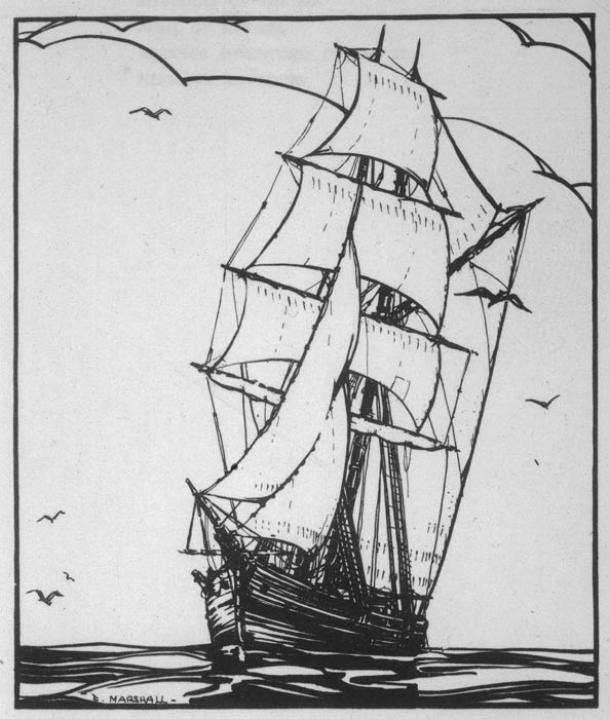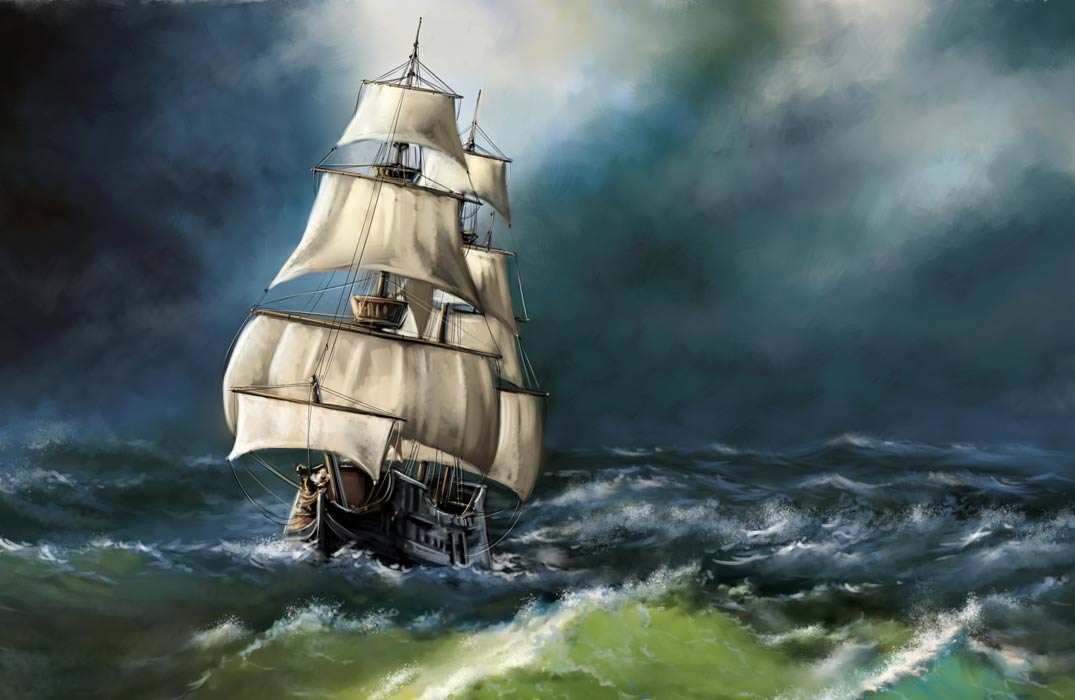 What happened to the crew of the Mary Celeste? Source: yaroslavartist /Adobe Stock
What happened to the crew of the Mary Celeste? Source: yaroslavartist /Adobe Stock
–
By dhwty
–
On December 4, 1872, a ship now known as the Mary Celeste was found adrift in the choppy seas of the Atlantic. The ship was in full sail and in sound and seaworthy condition with ample provisions, but when it was boarded it was found to be completely empty – the crew had vanished without a trace. It is a mystery that has endured for almost a 150 years.In January 1885, a ship slammed into Rochelois Reef, and was wrecked off the island of Haiti. The captain, Gilman Parker, sold the salvage rights to the American consul for $500, and made an insurance claim for the alleged value of the ship’s cargo. This was the end of one of the most infamous ships to have sailed the seas, the Mary Celeste. However, it was the incident 13 years prior to Parker’s wrecking of the Mary Celeste that made it one of history’s most enduring mysteries.
The Mary Celeste was a merchant brigantine that was launched under British registration in 1861 as the Amazon. Seven years later, she was transferred to American ownership, and was re-christened as the Mary Celeste.
The ship continued to sail uneventfully until her 1872 voyage from New York to Genoa. The ship’s captain was Benjamin Briggs, a man said to be a staunch abstainer from alcohol and a devout Christian. Captain Briggs was also described as a brave officer who would not abandon his ship unless to save his life. The first mate, Albert Richardson, was also considered fit to command, and was hand-picked by Captain Briggs. Additionally, Captain Brigg’s wife, his infant daughter, and six other crew members were on board the Mary Celeste.
 The Missing Crew of the Mary Celeste. From Left to Right: Benjamin Briggs, Captain of the Mary Celeste; Albert C. Richardson, First mate; Sarah Briggs, wife of Benjamin Briggs; Sophia Briggs, daughter of Benjamin and Sarah Briggs. (Public Domain)
The Missing Crew of the Mary Celeste. From Left to Right: Benjamin Briggs, Captain of the Mary Celeste; Albert C. Richardson, First mate; Sarah Briggs, wife of Benjamin Briggs; Sophia Briggs, daughter of Benjamin and Sarah Briggs. (Public Domain)
–
Towards the end of October 1872, the loading of the ship’s cargo – 1701 barrels of poisonous denatured alcohol – began. On November 7, the Mary Celeste left New York Harbor, and sailed into the Atlantic. On December 4, the British brigantine Dei Gratia discovered the Mary Celeste sailing aimlessly between the Azores and Portugal.
What was Found on the Mary Celeste?
Upon closer inspection, the crew of the Dei Gratia discovered that there was no one on board the Mary Celeste , and the last entry in the ship’s daily log was written on November 24 . In spite of this, the ship was still in seaworthy condition, her cargo still largely intact, and her food and water supply sufficient for six months.
It was also noted that the crew of the Mary Celeste had left their pipes for smoking behind. According to the explanation of the Dei Gratia ’s captain, David Morehouse, this was a sign that the crew had left the ship in a panic. Moreover, the ship’s single lifeboat, as well as her chronometer and sextant, were missing.
- The Mysterious Tjipetir Blocks – Dark Slabs with Cryptic Writing Found on Beaches Across Europe
- The Mysterious Lost Colony of Roanoke Island Vanished, Leaving Behind a Strange Message
- Ten incredible underwater discoveries that have captured our imagination
–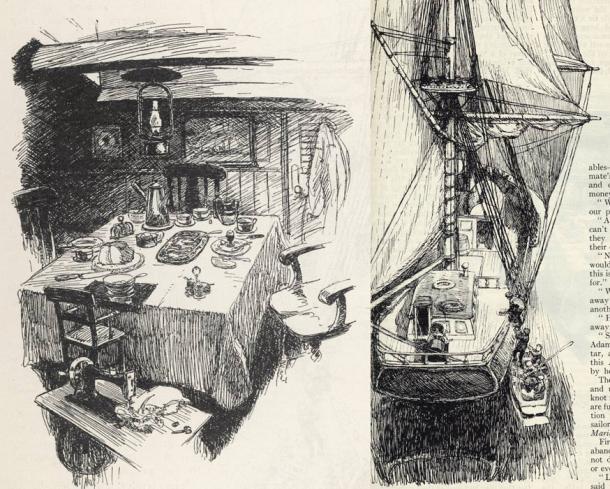 A half-eaten meal left in the ship’s cabin and the Dei Gratia crew boarding the Mary Celeste. December 5th, 1872. (Archivist /Adobe Stock)
A half-eaten meal left in the ship’s cabin and the Dei Gratia crew boarding the Mary Celeste. December 5th, 1872. (Archivist /Adobe Stock)
–
It was also revealed during the cross examination of Augustus Anderson (a seaman of the Dei Gratia ) in the Admiralty inquiry, that the main halyard, a sturdy rope about 8 cm (3 inches) in circumference, was found broken and hanging over the side of the Mary Celeste .
What Really Happened to the Mary Celeste?
From these bits of evidence, a possible scenario may be pieced together about what may have happened to the Mary Celeste: Something occurred on the Mary Celeste that made the captain panic, and he ordered the crew to get into the lifeboat, and abandon the ship. The halyard was then tied to the lifeboat, and the captain and his crew trailed behind the Mary Celeste to see what would happen to her.
The panic turned out to be a false alarm. But unfortunately for Captain Briggs, his family, and the crew, the halyard snapped during a raging storm , and they were unable to get themselves back to the Mary Celeste .
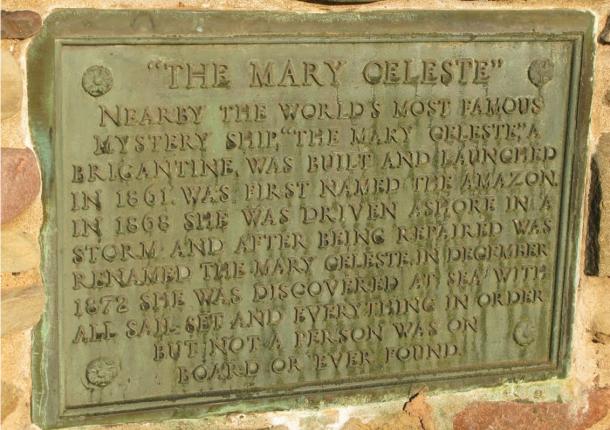 A memorial to the crew of the Mary Celeste, who vanished without a trace (lost-at-sea-memorials.com)
A memorial to the crew of the Mary Celeste, who vanished without a trace (lost-at-sea-memorials.com)
–
Other Explanations for the Abandonment of the Mary Celeste
The above scenario is perhaps one of the more logical and plausible explanations for the disappearance of the Mary Celeste’s crew. Nevertheless, there has not been any real consensus as to the cause of Captain Brigg’s panic, and numerous theories have been put forward. According to one sea captain, David Williams, the Mary Celeste was abandoned due to a seaquake, a relatively common phenomenon in the Azores.
Williams argues that the seaquake caused nine barrels of the denatured alcohol to spill. As a result, there was fear that the alcoholic fumes would cause an explosion, prompting the captain to abandon ship. Although there were nine empty barrels when the ship was found, they were all made of red oak, a more porous wood than the other white oak barrels, and thus more likely to leak. Furthermore, the crew that discovered the Mary Celeste did not report smelling any fumes from the alcohol and stated that the ship’s main hatch was secure – not blown off as it may have been by an intense wave of heat following an explosion.
However, some scholars still believe that an explosion might have actually happened. For example, Dr. Andrea Sella, a scientist at UCL (University College London), has demonstrated that a pressure-wave type of explosion might have occurred on the ship. When a spectacular wave of flame is produced, it is followed by relatively cold air, leaving neither soot, nor any marks of burning or scorching behind. Therefore, it is also possible that a huge, but relatively harmless, flame had terrified Captain Briggs into abandoning the Mary Celeste.
Another intriguing theory has been provided by the documentarian Anne MacGregor, who suggests the captain was dealing with rough seas, a faulty chronometer, and a clogged pump before he ordered everyone to abandon the ship. That combination may have caused Briggs to have difficulty in determining how much seawater was in his ship’s hull, which was so packed a visual survey may not have been helpful, and once he spotted land he may have thought it better to abandon the ship than wait for it to sink.
While the above theories seem plausible, their existence has not stopped the dissemination of wild rumors and speculations regarding the final fate of the crew members. Over the decades, various suggestions have been made including crew mutiny, or the murder of a drunken crew by the crew of the Dei Gratia, who found the Mary Celeste. Others have even suggested death by a giant octopus or squid, alien abduction, or that the crew came upon a derelict ship containing treasure and deserted the Mary Celeste to live happily ever-after in Spain.
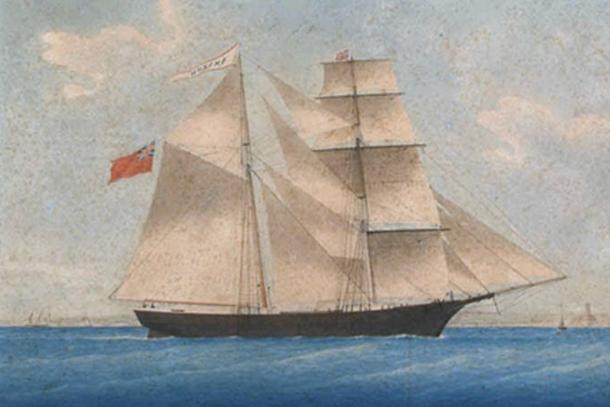 A painting of the Mary Celeste as Amazon in 1861. (Public Domain)
A painting of the Mary Celeste as Amazon in 1861. (Public Domain)
–
If new evidence comes to light in the future, we just might be able to gain a better understanding of what really happened to the Mary Celeste on her fateful voyage in 1872, and perhaps solve this mystery once and for all.
–
–
(For the source of this, and many other equally intriguing articles, please visit: https://www.ancient-origins.net/unexplained-phenomena/mystery-mary-celeste-crew-vanishes-seaworthy-ship-002958/)









